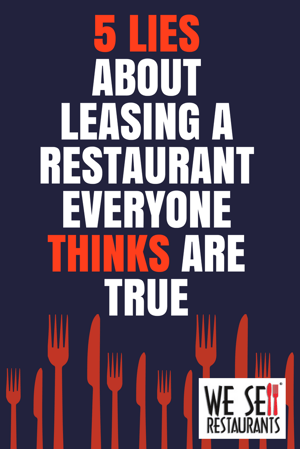It’s every man for himself when you are leasing a restaurant and here’s why. The landlord is out for himself and no one else. Here are five things you don’t want to learn the hard way – the five lies about leasing a restaurant used by landlords.
It’s the time of year when all the landlords in the world are gathered in Las Vegas at the ICSC (International Council of Shopping Centers) convention. They are drinking by night and plotting by day on ways to bring down you, the little guy who’s leasing a restaurant. Here are the top five lies they will tell you when leasing the restaurant.
I’m the landlord and I’m here to help is lie number one.
President Ronald Reagan referred to these words, “I’m from the government and I’m here to help” as “the most terrifying words in the English language.” He might say the same thing about landlords today. Any landlord that says, “I’m here to help…” is practicing lie number one. Here are some examples you should be aware of when leasing a restaurant.
“I’m the landlord and I’m here to help you with tenant improvement money. I’ll invest in your business along with you.” Is this true? No. The landlord is pricing that tenant improvement money into your lease rate and being paid back a very healthy (or should we say unhealthy and obscene?) amount.
“I’m the landlord and I’m here to help you with lease rates. I want you to succeed.” Is this true? No. The landlord is looking at only one person in the transaction to help. He wants to improve his checkbook, his bottom line and his earnings. He has no interest in helping you succeed. Consider this. If you fail, he still gets paid. If you fail, he gets the property back, fully improved AND your equipment (in most cases).
The Personal Guarantee is non-negotiable is lie number two.
Everything in life is negotiable. Just because the landlord says he wants a blanket guarantee over the entire term of the lease does not make it true. You can negotiate for a limited guarantee – meaning, limited to just two years or just the first term or just $50,000 or just one year of lease payments or whatever you want. Always propose something other than a full and unconditional guarantee of t

he lease for the full term. Do not believe this cannot be negotiated in some form or fashion, particularly when you have good credit, a strong concept and money in the bank. The minute you sign, you lose all leverage.
I will not “unreasonably withhold” consent to transfer is lie number three when leasing a restaurant.
As a restaurant broker interacting with landlords every single day on lease assignments, I can assure you this is the biggest whopper of them all. Do not rely on this language when leasing a restaurant (even though it has been litigated and has precedent in legal cases) as a “catch-all” to believe your lease transfer will go easily.
Insist on specific, measurable steps with a timeline in the event you ever transfer the store when leasing a restaurant. Set up clauses that say a new franchisee of the same concept with a net worth of $500,000 shall be accepted upon notice and such notice shall constitute a 30 day window for landlord approval. Should he or she not object within 30 days, then the assumption is granted.
Work with an attorney on the language (disclaimer: I’m not an attorney and am not offering legal advice). My business advice as a restaurant broker is for you to be as precise as possible around costs to transfer, timeline to transfer and any net worth requirement. What you don’t want is for a landlord to be able to delay a transfer, charge whatever he wants and arbitrarily designate what’s acceptable net worth requirements.
Refuse to sign anything that is vague. Require the business terms to conform to language like this.
- Costs
- “Reasonable Attorney fees” – NO – what’s reasonable to the landlord is not reasonable to you.
- Lease transfer fee not to exceed $1000 – YES – defined and specific.
- Timeline
- Shall not unreasonably withhold – NO
- Shall be approved within 30 days - YES
- Net Worth number
- Same net worth as current tenant -- NO, too subjective, how do you prove what yours was and what his will be?
- Net worth of $500,000 or more – YES.
We Sell Restaurants is working with landlords daily that are trying to charge immense fees, drag their feet and then will not approve a franchise candidate who has already been through an approval process for both lending and the franchise brand without any issues. Don't fall for the landlord's lies when leasing a restaurant.
The Property Manager and Leasing Agent are there to help is lie number four.
If you call the sign on the door when leasing a restaurant, that number goes to the landlord’s leasing agent. You are under no obligation to work directly with them but they will not disclose this to you or ask if you wan to bring your own representation to the table. After you open the business, it’s common to develop a close working relationship with the property manager who is either onsite or responsive when you have an issue. Often the landlord’s representative will even tell you that as soon as the lease assigned, the Property Manager is your “go to” person. Remember, they do not work for you. They work for the landlord.
This lie is very similar to lie number one. When either of these parties agree to “help,” it is the landlord who receives the benefit. The leasing agent is paid a commission based on the size of the lease he negotiates. The bigger the number, the more he earns.
When it comes time to transfer, the property manager onsite, your good buddy, has absolutely nothing to do with the deal. It’s a common fallacy to equate this person with the landlord. He or she does not have decision making authority. Typically the property manager cannot even receive documents related to a lease transfer. Don’t fall into a trap of thinking they are you ally and can get your assignment done or will take your side in any form of a landlord dispute no matter what they say.
Remember, when leasing a restaurant, the Property Manager and Leasing Agent’s loyalty (and paycheck) reside with the landlord. We always advise you to use the services (usually at no charge to you) of a qualified restaurant broker to represent you with negotiations on leasing a restaurant.
We’re exclusively working with you is lie number five.
A landlord is like a girlfriend (or boyfriend) that cheats. Don’t ever trust them to be exclusive. You may have thousands of dollars in legal fees invested in leasing a restaurant and the final draft in hand but if the landlord gets a better offer, he’ll drop you like a hot potato. Leasing a restaurant starts with an LOI or letter of intent but is not final until you have a lease signed by both you, the tenant and the landlord. Letters of intent are not binding. Most do not have a ‘no-shop’ clause, allowing the landlord to continue to shop this with anyone and everyone until it’s inked.
It’s not uncommon to see landlords take your letter of use it to leverage someone else into leasing a restaurant despite that fact that you’re putting time and money, drawing plans, and otherwise investing in this opportunity.
We have seen landlords accept signed leases from tenants and then decide to go with someone else if a big brand throws enough money their way. Don’t let them fool you into thinking you’re the only game in town. Until it’s inked, it isn’t real. If it isn’t stated in the lease, it isn’t real. Don’t leave any points out of that lease that were discussed. Never agree that such and such was discussed and when the time comes, the landlord will handle it.
Above all, by reading this article, please understand that when it comes to landlords, you can never underestimate them. Use what you learned to get the best deal possible for leasing a restaurant. Cover yourself going in and have a secured strategy for getting out. If you need help, contact one of our restaurant brokers to help you negotiate a deal. Don’t get caught by one of these five lies about leasing a restaurant landlords often use.


 404-800-6700
404-800-6700.png)










